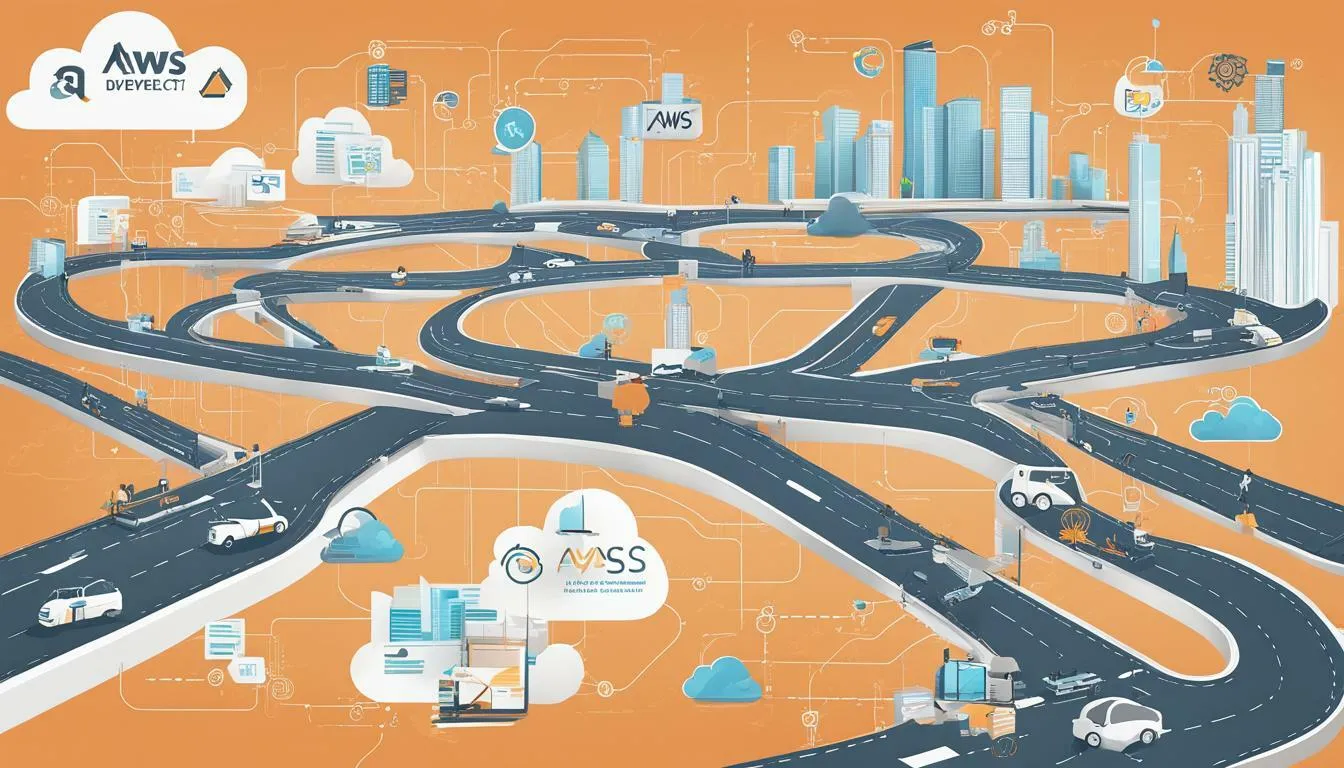As the demand for cloud technology continues to grow, the role of AWS Developers has become increasingly important. AWS (Amazon Web Services) is one of the leading cloud service providers, and their platforms and tools require skilled developers to design, build, and maintain cloud-based applications and services.
In this guide, I will provide an overview of
AWS Developer roles, including their job description and responsibilities. We will delve deeper into the specific skills and qualifications needed to become a successful AWS Developer, as well as the significance of obtaining AWS Developer certifications. We will also examine the various responsibilities that an AWS Developer undertakes in their day-to-day work and provide insights into the salary range for AWS Developers. Additionally, we’ll explore different roles and specializations within the AWS Developer field, along with the in-demand skills required for each. Lastly, we will provide guidance on how to advance your career as an AWS Developer and highlight potential growth opportunities.
Key Takeaways:
- AWS Developers are essential in designing, building and maintaining cloud-based applications and services using AWS.
- The AWS Developer job description requires specific skills and qualifications that include proficiency in programming languages, experience with AWS platforms and tools, and knowledge of cloud security and governance.
- AWS Developer certifications hold significant value in the job market and can improve career growth opportunities.
- AWS Developers are responsible for designing, deploying, troubleshooting, and maintaining AWS-based applications and services.
- The salary range for AWS Developers varies based on job level, work experience, and geographic location.
- AWS Developer Roles and Specializations include AWS Cloud Architect, AWS DevOps Engineer, and AWS Cloud Security Engineer, among others.
- As the cloud technology landscape continues to evolve, AWS Developers must continually develop in-demand skills to remain relevant in the job market.
- AWS Developers can advance their careers by gaining experience, pursuing advanced certifications, and staying up-to-date on the latest industry trends.
Understanding the AWS Developer Job Description
As an AWS Developer, you will be responsible for designing, developing and deploying applications on the Amazon Web Services (AWS) platform. This role requires a deep understanding of AWS services, as well as proficiency in programming languages like Java, Python, or Ruby, among others.
The
AWS Developer job description includes a range of responsibilities, such as building scalable and secure cloud-based applications, integrating AWS services with external systems, and automating infrastructure deployment.
To be successful in this role, you must have strong problem-solving skills, be able to work independently and as part of a team, and have excellent communication skills. You will also need to stay up-to-date with the latest trends and technologies in cloud computing and AWS services.
AWS Developer Responsibilities
As an AWS Developer, your responsibilities will include:
- Designing, developing, and maintaining AWS-based applications
- Integrating AWS services with external systems and third-party applications
- Automating infrastructure deployment using tools like AWS CloudFormation and Terraform
- Testing and debugging applications to ensure they meet the required standards for performance, scalability, and security
- Collaborating with cross-functional teams to develop software solutions that meet business needs
AWS Developer Qualifications
To become an AWS Developer, you need to have a bachelor’s degree in Computer Science, Engineering, or a related field. Additionally, you should have experience developing applications using AWS services, such as EC2, S3, RDS, and Lambda.
It is also essential to have a strong understanding of software development principles, including version control, agile methodologies, and DevOps practices. Proficiency in programming languages such as Java, Python, or Ruby is also necessary.
Lastly,
AWS Developer certification is highly desirable and can serve as a valuable indicator of your expertise in AWS services and development skills.

Understanding the
AWS Developer job description and responsibilities is crucial for aspiring developers looking to start a career in cloud computing. A combination of education, experience, and certification can help you progress in this field and prepare you for the challenges and opportunities that come with working on the AWS platform.
Skills and Qualifications for an AWS Developer
Being an AWS Developer requires a specific set of skills and qualifications to succeed in this field. Here are some of the most important skills and qualifications that a successful AWS Developer should possess:
| Skill/Qualification |
Description |
| Programming Languages |
An AWS Developer should have a strong understanding of programming languages such as Java, Python, or Ruby. |
| Database Knowledge |
Experience with databases like MySQL, MongoDB, and Cassandra can help AWS Developers in creating and managing cloud-based applications and services. |
| Cloud Computing Knowledge |
Understanding of cloud computing services, such as Amazon S3, EC2, and Cloudfront, is essential to scale and deploy applications in the cloud environment. |
| Problem-Solving Skills |
AWS Developers should be able to identify and solve complex problems related to application development and deployment in cloud environments. |
| Communication Skills |
Effective communication skills are necessary for AWS Developers to collaborate with other developers and non-technical stakeholders. |
| Education & Qualifications |
Most AWS developer roles require a Bachelor’s degree in Computer Science, Software Engineering or an equivalent field. Certifications such as AWS Certified Developer Associate, AWS Certified DevOps Engineer, and AWS Certified Solutions Architect are also highly valued in this field. |
As the cloud computing industry continues to grow, so does the demand for skilled AWS Developers. Possessing the necessary skills and qualifications is crucial in building a successful career in this field.

The Importance of AWS Developer Certification
As an AWS Developer, obtaining the right certification is essential for career growth and job prospects. AWS offers a range of certifications, each covering different aspects of the cloud platform. These certifications validate your knowledge and skills in the field and show potential employers that you have the necessary expertise to develop and maintain AWS applications and services.
One of the most popular certifications for AWS Developers is the AWS Certified Developer
– Associate. This certification validates your ability to develop and maintain AWS applications using tools like AWS CLI, AWS SDKs, and AWS CloudFormation.
| Certification |
Description |
| AWS Certified Developer – Associate |
Validates your ability to develop and maintain AWS applications. |
| AWS Certified DevOps Engineer – Professional |
Validates expertise in provisioning, operating, and managing distributed application systems on the AWS platform. |
| AWS Certified Solutions Architect – Associate |
Validates expertise in designing and deploying scalable, highly available, and fault-tolerant systems on AWS. |
Obtaining an AWS certification not only demonstrates your knowledge and skills in the field but also opens the door to new job opportunities and potential salary increases. According to Payscale.com, AWS Certified Developers can earn an average salary of $117,000 per year, with some earning as much as $170,000 per year.

Investing in your AWS certification is an investment in your career. With the ever-increasing demand for cloud technology, AWS Developers are in high demand, and having the right certification can give you a competitive edge in the job market.
Exploring AWS Developer Responsibilities
As an AWS developer, the job responsibilities are varied and complex, requiring a deep understanding of cloud computing and the ability to work with a range of AWS services.
First and foremost, AWS developers are responsible for designing, developing, and maintaining cloud-based applications. This involves working closely with cross-functional teams to understand business requirements and translating them into technical solutions. AWS developers must have a strong grasp of programming languages, such as Java, Python, and C++, as well as experience with databases and software development tools.
In addition to application development, AWS developers are also responsible for deploying applications, monitoring their performance, and troubleshooting any issues that arise. This requires a comprehensive understanding of Amazon Web Services, including EC2, S3, and AWS Lambda, as well as experience with automation tools like Jenkins and Git.
Another critical responsibility of AWS developers is security. They must ensure that applications and data hosted on AWS adhere to industry-standard security protocols and are protected from potential threats. This involves setting up access controls, configuring firewalls, and implementing encryption.

Finally, AWS developers must stay up to date with the latest advancements in cloud computing and be able to implement new technologies and services as needed. They must have excellent communication and problem-solving skills, as well as the ability to work well under pressure and prioritize tasks effectively.
Overall, AWS developers play a crucial role in designing and maintaining cloud-based applications, ensuring their secure and reliable operation, and staying ahead of the curve in an ever-changing industry.
AWS Developer Salary and Career Path
As an AWS Developer, you can expect a competitive salary that varies based on your experience and location. According to Glassdoor, the average annual salary for an AWS Developer in the United States is $112,000. However, this can range from $74,000 to $163,000 depending on factors such as location, years of experience, and type of company.
The demand for skilled AWS Developers is on the rise, and this trend is expected to continue for the foreseeable future. As cloud technology continues to evolve, more and more companies will require the expertise of AWS Developers to help them navigate this landscape. This means that there are many potential career paths available to someone who decides to pursue a career in AWS development.
One potential career path for AWS Developers is to become a Solutions Architect. As a Solutions Architect, you would be responsible for designing and implementing complex cloud solutions for clients. This role requires a deep understanding of AWS technology and strong communication skills, as you would be working closely with clients to understand their needs and translate them into technical solutions.
Another potential career path for AWS Developers is to specialize in a specific area of AWS technology, such as security or data analytics. By pursuing specialized training and certifications in these areas, you can position yourself as an expert in a particular niche, increasing your earning potential and job opportunities.

Key AWS Developer Roles and Specializations
As we have discussed earlier,
AWS Developers are responsible for designing, building, and maintaining secure, scalable, and highly available cloud solutions using Amazon Web Services (AWS) technologies. Within the AWS Developer field, there are several roles and specializations to consider, each with its unique set of responsibilities and required skills.
AWS Cloud Architect
The AWS Cloud Architect is responsible for designing and implementing secure, scalable, and highly available cloud solutions. They collaborate with cross-functional teams to understand business requirements, design and deploy cloud infrastructure, and optimize application performance. To excel in this role, candidates need to have a deep understanding of AWS services, infrastructure automation, and DevOps best practices.
AWS Cloud Developer
The AWS Cloud Developer is responsible for developing and maintaining cloud-based applications on the AWS platform. They work closely with cross-functional teams to understand business requirements, design and deploy infrastructure, and develop application code. To excel in this role, candidates need to have a strong background in software development, cloud computing, and AWS services, such as Amazon S3, EC2, and Lambda.
AWS DevOps Engineer
The AWS DevOps Engineer is responsible for automating the deployment, scaling, and monitoring of cloud-based applications. They collaborate with cross-functional teams to build and implement continuous integration and continuous delivery (CI/CD) pipelines, automate infrastructure, and monitor application performance. To excel in this role, candidates need to have a strong background in software development, cloud computing, and deployment automation tools, such as AWS CloudFormation and Chef.
The AWS Developer field is constantly evolving, and new roles are emerging as technology advances. By developing a deep understanding of AWS services, infrastructure automation, and DevOps best practices, you can stay ahead of the curve and build a successful career in cloud technology.

Developing In-Demand Skills for AWS Developers
As a constantly evolving field, AWS development demands a diverse set of skills that can keep up with its pace and complexity. AWS Developers are expected to be well-versed in a wide range of coding languages, cloud infrastructure, and deployment automation tools. Here are some essential
AWS Developer skills to focus on:
- Proficiency in programming languages: JavaScript, Python, Ruby, and Java are some of the essential coding languages an AWS Developer should know. Solid knowledge of these languages can help developers build secure and scalable cloud infrastructure quickly.
- Cloud infrastructure: Being familiar with AWS services like EC2, Lambda, Elastic Load Balancer, and S3 is critical to becoming an AWS Developer. Knowledge of how to configure and deploy these services can make a difference in scaling the application.
- Containers and microservices: Knowledge of containers and microservices helps AWS developers build resilient and scalable applications. Familiarizing oneself with containerization tools like Docker and Kubernetes, and serverless architecture tools like AWS Lambda, can provide a competitive edge in the job market.
- Distributed systems: Developing and maintaining large scale distributed systems can be challenging. AWS developers should have hands-on experience with tools like Apache Kafka, Apache Spark, and Hadoop. The ability to design distributed systems can help an AWS Developer optimize the application’s performance.
Investing in continuing education, taking courses on Udemy, Coursera, and official AWS courses, and attending conferences can help AWS Developers stay ahead of the curve and develop in-demand skills.

“As an AWS Developer, you must keep your knowledge and skills up-to-date by continuously learning new tools and technologies. This will help you stay competitive and relevant in the ever-changing technological landscape.”
How Can Video Ads on Facebook Help in AWS Developer Roles?
Advertising your AWS developer skills through Facebook video can be a significant advantage. By using compelling Facebook video ads, developers can highlight their abilities and prove their expertise in AWS. These promotional tools serve as a powerful method for drawing in potential employers and showcasing the developer’s talent and potential offerings. Selecting strategic video ads can help developers stand out among the competition, thereby enhancing their chances of landing a sought-after AWS developer job.
Advancing Your Career as an AWS Developer
As an AWS Developer, there are several ways to advance your career and climb the career ladder. One of the most important steps is to continuously upskill and stay updated with the latest trends and technologies in the AWS ecosystem.
One approach to advancing your career is to specialize in a particular area of AWS development, such as security, machine learning, or database management. This level of specialization can make you indispensable to your organization and open up new career opportunities.
Another way to advance your career is to take on leadership roles within your organization, such as becoming a team leader or project manager. This can help you develop strong communication skills and gain experience managing resources, budgets, and deadlines, further increasing your employability.
Obtaining AWS certifications is another great way to advance your career, not only by demonstrating your technical skills and knowledge to potential employers but also by opening up new job opportunities and possibly increasing your salary.
Networking and building relationships with other professionals in the AWS industry can also help you advance your career. Attending AWS conferences, participating in online communities, and networking on LinkedIn are all great ways to connect with other professionals and learn about new opportunities.
It is also important to keep in mind that as cloud technology continues to evolve, new AWS Developer roles and responsibilities may emerge. Keeping up with these changes and adapting to new challenges can help you stay relevant and advance your career in the AWS industry.
Overall, with the right mindset, dedication, and continuous learning, an AWS Developer can forge a successful career path in the ever-growing cloud technology industry.

Conclusion
AWS Developer roles are becoming increasingly important in the cloud technology landscape. As we’ve discussed throughout this guide, AWS Developers are responsible for designing, developing, and deploying cloud-based applications and services. In addition to application development, AWS Developers also work with various AWS services to integrate and manage resources. This includes tasks such as configuring cloud infrastructure, setting up automated deployments, and
renaming git branches to ensure smooth code management and version control. With the continuous growth of cloud computing, the demand for skilled AWS Developers who can handle these responsibilities is expected to rise.
We’ve explored the AWS Developer job description, including the required qualifications and skills, as well as the various responsibilities that an AWS Developer undertakes in their day-to-day work. Obtaining AWS Developer certifications and developing in-demand skills are also crucial aspects of advancing in this field.
As an AWS Developer, you can expect a competitive salary and a range of potential career paths and specializations. By continually developing your skills and knowledge, you can position yourself for growth opportunities and career advancement.
Overall, AWS Developer roles offer exciting and rewarding career opportunities in the rapidly evolving cloud technology industry. By staying up to date with the latest advancements and constantly striving to improve your skills, you can set yourself up for a successful and fulfilling career as an AWS Developer.
FAQ
Q: What are AWS Developer roles?
A: AWS Developer roles involve developing and maintaining applications on the Amazon Web Services (AWS) platform. They are responsible for designing, coding, testing, and debugging software applications using AWS services and tools.
Q: What is the job description of an AWS Developer?
A: The job description of an AWS Developer typically includes tasks such as designing and implementing scalable and secure cloud solutions, collaborating with cross-functional teams, troubleshooting and resolving technical issues, and staying updated with the latest AWS services and best practices.
Q: What are the responsibilities of an AWS Developer?
A: AWS Developers are responsible for developing and deploying applications on AWS, managing cloud infrastructure, optimizing application performance, implementing security measures, and ensuring the scalability and reliability of cloud-based solutions.
Q: What skills and qualifications are required for an AWS Developer?
A: To excel as an AWS Developer, one needs a strong understanding of AWS services, programming languages (such as Python, Java, or JavaScript), experience with cloud deployment and management tools, knowledge of serverless computing, and familiarity with DevOps practices. A relevant degree or certification in cloud computing is often preferred.
Q: Is AWS Developer certification important?
A: AWS Developer certifications validate your expertise in AWS services and enhance your credibility in the job market. They demonstrate your skills in designing, developing, and deploying applications on the AWS platform, increasing your chances of getting hired or advancing in your career.
Q: What is the salary range for AWS Developers?
A: The salary of an AWS Developer can vary depending on factors such as experience, location, skills, and certifications. However, the average salary for AWS Developers ranges from $90,000 to $130,000 per year.
Q: What are the different roles and specializations within the AWS Developer field?
A: Within the AWS Developer field, there are various roles and specializations, such as AWS Solutions Architect, AWS DevOps Engineer, AWS Data Engineer, AWS Security Engineer, and AWS Machine Learning Engineer. Each role has its own set of responsibilities and focus areas.
Q: How can I advance my career as an AWS Developer?
A: To advance your career as an AWS Developer, you can continuously update your skills by learning new AWS services, pursuing advanced certifications, gaining experience with complex projects, and actively participating in the AWS community through networking and knowledge-sharing.
 Understanding the AWS Developer job description and responsibilities is crucial for aspiring developers looking to start a career in cloud computing. A combination of education, experience, and certification can help you progress in this field and prepare you for the challenges and opportunities that come with working on the AWS platform.
Understanding the AWS Developer job description and responsibilities is crucial for aspiring developers looking to start a career in cloud computing. A combination of education, experience, and certification can help you progress in this field and prepare you for the challenges and opportunities that come with working on the AWS platform.

 Investing in your AWS certification is an investment in your career. With the ever-increasing demand for cloud technology, AWS Developers are in high demand, and having the right certification can give you a competitive edge in the job market.
Investing in your AWS certification is an investment in your career. With the ever-increasing demand for cloud technology, AWS Developers are in high demand, and having the right certification can give you a competitive edge in the job market.
 Finally, AWS developers must stay up to date with the latest advancements in cloud computing and be able to implement new technologies and services as needed. They must have excellent communication and problem-solving skills, as well as the ability to work well under pressure and prioritize tasks effectively.
Overall, AWS developers play a crucial role in designing and maintaining cloud-based applications, ensuring their secure and reliable operation, and staying ahead of the curve in an ever-changing industry.
Finally, AWS developers must stay up to date with the latest advancements in cloud computing and be able to implement new technologies and services as needed. They must have excellent communication and problem-solving skills, as well as the ability to work well under pressure and prioritize tasks effectively.
Overall, AWS developers play a crucial role in designing and maintaining cloud-based applications, ensuring their secure and reliable operation, and staying ahead of the curve in an ever-changing industry.





